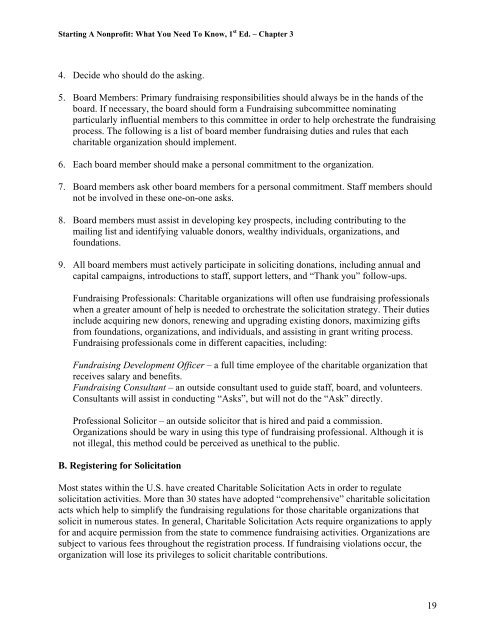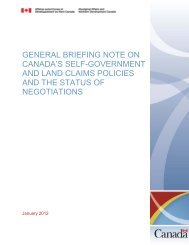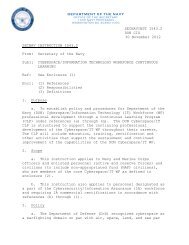HowToFormANonprofit_1st_ed-Chapter3
HowToFormANonprofit_1st_ed-Chapter3
HowToFormANonprofit_1st_ed-Chapter3
Create successful ePaper yourself
Turn your PDF publications into a flip-book with our unique Google optimized e-Paper software.
Starting A Nonprofit: What You Ne<strong>ed</strong> To Know, 1 st Ed. – Chapter 3<br />
4. Decide who should do the asking.<br />
5. Board Members: Primary fundraising responsibilities should always be in the hands of the<br />
board. If necessary, the board should form a Fundraising subcommittee nominating<br />
particularly influential members to this committee in order to help orchestrate the fundraising<br />
process. The following is a list of board member fundraising duties and rules that each<br />
charitable organization should implement.<br />
6. Each board member should make a personal commitment to the organization.<br />
7. Board members ask other board members for a personal commitment. Staff members should<br />
not be involv<strong>ed</strong> in these one-on-one asks.<br />
8. Board members must assist in developing key prospects, including contributing to the<br />
mailing list and identifying valuable donors, wealthy individuals, organizations, and<br />
foundations.<br />
9. All board members must actively participate in soliciting donations, including annual and<br />
capital campaigns, introductions to staff, support letters, and “Thank you” follow-ups.<br />
Fundraising Professionals: Charitable organizations will often use fundraising professionals<br />
when a greater amount of help is ne<strong>ed</strong><strong>ed</strong> to orchestrate the solicitation strategy. Their duties<br />
include acquiring new donors, renewing and upgrading existing donors, maximizing gifts<br />
from foundations, organizations, and individuals, and assisting in grant writing process.<br />
Fundraising professionals come in different capacities, including:<br />
Fundraising Development Officer – a full time employee of the charitable organization that<br />
receives salary and benefits.<br />
Fundraising Consultant – an outside consultant us<strong>ed</strong> to guide staff, board, and volunteers.<br />
Consultants will assist in conducting “Asks”, but will not do the “Ask” directly.<br />
Professional Solicitor – an outside solicitor that is hir<strong>ed</strong> and paid a commission.<br />
Organizations should be wary in using this type of fundraising professional. Although it is<br />
not illegal, this method could be perceiv<strong>ed</strong> as unethical to the public.<br />
B. Registering for Solicitation<br />
Most states within the U.S. have creat<strong>ed</strong> Charitable Solicitation Acts in order to regulate<br />
solicitation activities. More than 30 states have adopt<strong>ed</strong> “comprehensive” charitable solicitation<br />
acts which help to simplify the fundraising regulations for those charitable organizations that<br />
solicit in numerous states. In general, Charitable Solicitation Acts require organizations to apply<br />
for and acquire permission from the state to commence fundraising activities. Organizations are<br />
subject to various fees throughout the registration process. If fundraising violations occur, the<br />
organization will lose its privileges to solicit charitable contributions.<br />
19





